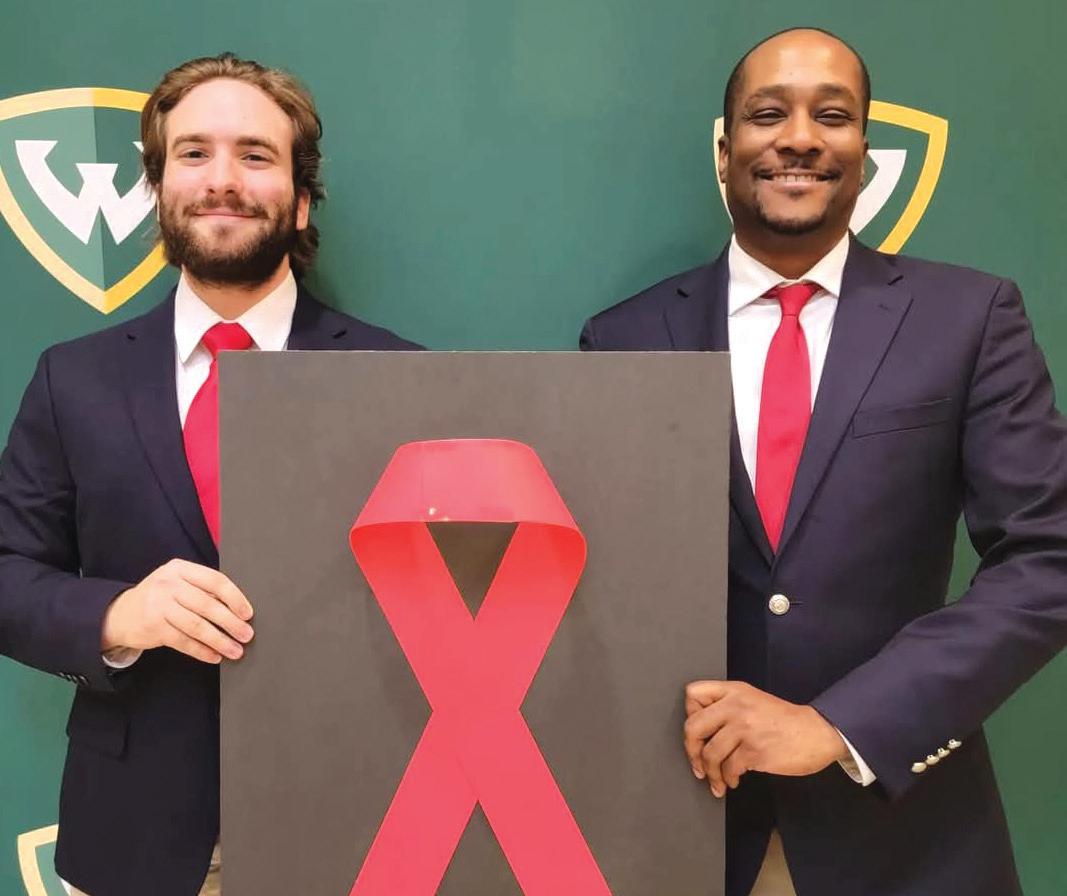
5 minute read
PHARMACISTS & PREP/PEP: AN UNTAPPED POTENTIAL FOR HIV PREVENTION
BY JOSEPH PAUL JAVIER, REMOUN KATTOULA and OBIOMA OPARA, Wayne State University student pharmacists
A key part of the Ending the HIV Epidemic (EHE) initiative is expanding access to prevention methods, particularly Pre-Exposure Prophylaxis and Post-Exposure Prophylaxis (PrEP/PEP). The EHE initiative highlights pharmacists' key role in improving access to PrEP/PEP. It recognizes pharmacists as essential health care providers due to their accessibility, expertise in medication management and ability to engage with communities directly.
The EHE initiative identifies Michigan as a hot spot for HIV, particularly within the Metro Detroit area. According to the latest data from the Michigan Department of Health and Human Services, more than 18,000 Michiganders are currently living with HIV and its prevalence is on the rise. The Centers for Disease Control reports that more than one-third of people in the U.S. who could benefit from PrEP were prescribed it. However, Black and Latino people are disproportionately under-prescribed PrEP relative to their need for HIV prevention. Many from these communities also may not be aware of PEP to prevent HIV infection or that PEP needs to be taken within 72 hours of exposure to be effective.
By incorporating pharmacists into the fight against HIV, we can better address these disparities. Pharmacists can make a profound and lasting impact on the community, significantly improving access to these lifesaving medications.
Pharmacist-led PrEP/PEP is just as effective as traditional models
In some states, pharmacists are already authorized to prescribe and dispense PrEP/PEP directly to patients, which removes barriers to access, such as the need to see a physician for a prescription. This is part of a broader push to allow pharmacists to provide services traditionally performed by doctors, which can be especially crucial in underserved areas and minority groups. A study done in Mississippi proved pharmacists were effective at initiating same-day PrEP, especially among low-income Black men who have sex with men. Another pharmacist-led tele-PrEP clinic demonstrated high adherence rates for their patients, with roughly 90% of them taking their PrEP as prescribed. As medication experts, pharmacists can work with other medical professionals to ensure coordinated care for patients on PrEP or PEP. This interdisciplinary collaboration can ensure that individuals get the appropriate screenings, follow-up care and support they require.
PrEP/PEP accessed at community pharmacies and stigma associated with HIV prevention
Pharmacists are encouraged to raise awareness of PrEP/PEP in communities and educate individuals about their availability. This includes identifying people at risk of HIV and discussing prevention options in a non-stigmatizing way. Research shows that 81% of pharmacists are willing to provide PrEP/PEP, but less than 13% of pharmacies initiate these HIV prevention therapies. HIV, with its persistent stigma and associated structural barriers to clinical engagement, presents a prime opportunity for community pharmacist intervention.
Studies have shown that patients eligible for PrEP/PEP may be reluctant to visit dedicated STI clinics or infectious disease physicians due to the perceived stigma of being seen at these locations or the fear of being “outed.” Differentiated delivery via community pharmacies could expand PrEP/PEP access to this population as people go to community pharmacies for various reasons, not just for sexual health. In the community pharmacy setting, patients can receive sexual health resources, get screened for PrEP/PEP eligibility and pick up their PrEP/ PEP prescriptions in an easily-accessible location without fear of being associated with a dedicated clinic for HIV or other STIs.
Increased access and implementation of PrEP/PEP
Aside from addressing stigma, pharmacist-initiated PrEP/PEP increases accessibility in many other ways. With approximately 89% of Americans living within five miles of a pharmacy, including rural or economically disadvantaged areas, pharmacists are vital to addressing gaps in access to PrEP/PEP. This emphasizes pharmacists’ role in ensuring that people who may otherwise face barriers to care have easier access to these life-saving medications.
Pharmacists play a key role in adherence to PrEP and PEP, ensuring patients understand how to take the medications correctly and how they work, the importance of continued use, assisting with financial barriers and managing potential side effects. Adherence can be monitored through refill tracking and follow-up appointments, ensuring patients stay on track. Personalized care tailored to the patient's lifestyle and preferences enhances adherence, as does offering culturally sensitive support. However, the distribution of community pharmacies currently providing PrEP/PEP is less concentrated in rural areas. Addressing the availability of coverage will improve public health outcomes statewide.
Next steps needed for pharmacist-led PrEP/PEP
Tapping pharmacists to increase PrEP/PEP accessibility is not without its barriers. To implement effective community pharmacy PrEP and PEP programs, the health care system should expand pharmacists’ PrEP and PEP education and incorporate ordering and monitoring of laboratory tests, workspace and workflow changes as appropriate to their site.
Several steps can be taken to prepare pharmacists to provide PrEP and PEP services better and help accomplish the goals of the EHE Initiative. Research shows that while pharmacists are willing to provide PrEP/PEP to their patients, they would be more confident in doing so and providing appropriate counseling with additional HIV prevention education. Pharmacists should receive comprehensive training on HIV medications – including PrEP and PEP – and their latest clinical guidelines, drug interactions, potential side effects and adherence strategies. Continuing education programs and specialized certifications can enhance pharmacists' knowledge and confidence in delivering these services.
Advocating for changes in state laws and regulations to grant pharmacists the ability to prescribe, dispense, and provide necessary follow-up care is crucial to improving patient access and care. By focusing on these areas, pharmacists will be better equipped to provide practical, accessible PrEP/PEP services that contribute to the goals of the Ending the HIV Epidemic.








